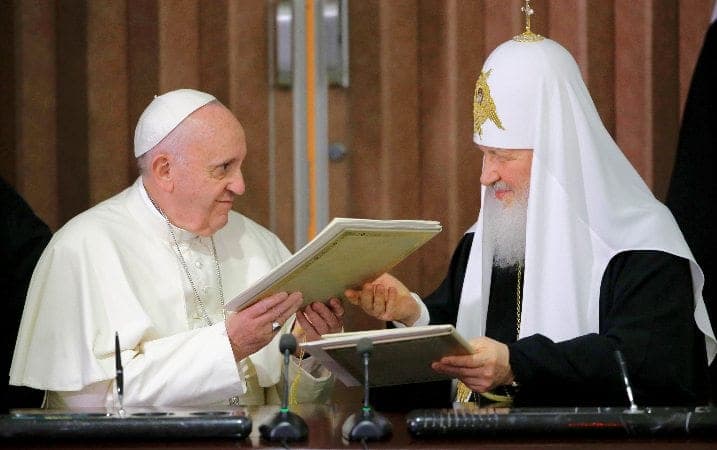ROME – Pope Francis told an Argentine journalist that his planned second meeting with Russian Orthodox Patriarch Kirill – penciled in for June in Jerusalem – has been canceled, and argued that there is no sense in him visiting Kyiv if Russia’s invasion of Ukraine would resume “the following day.”
“I cannot do anything that would jeopardize higher objectives, which are the end of the war, a truce or at least a humanitarian corridor,” he said, speaking with Argentine newspaper La Nacion. “What would be the use of the pope going to Kyiv if the war continues the next day?”
On his refusal thus far to mention either Russia or its president Vladimir Putin, Francis said that no pope ever condemns a head of state, “much less a country, which is superior to its head of state.”
The pope and the patriarch met for the first time in 2016 at the airport of Havana, Cuba.
There have been several reports of a planned meeting between the two religious leaders to be held later this year.
The pontiff also said that there are always efforts from the Vatican to work for a lasting peace.
“I cannot tell you the details because they would no longer be diplomatic efforts. But the attempts will never cease,” Francis wrote.
Speaking about his unprecedented visit to the Russian embassy to the Holy See the day after the invasion of Ukraine began on Feb. 24, Francis said that it was his own decision.
“It is clear for those who want to see it well that I was signaling to the government that it can put an end to the war this instant,” he said. “To be honest with you, I would like to do something so that there will not be one more death in Ukraine. Not one more. And I am ready to do everything.”
Francis said, “All war is anachronistic in this world and at this stage of civilization. That is why I also publicly kissed the Ukrainian flag. It was a gesture of solidarity with their dead, with their families, and with those who suffer emigration.”
Speaking about Kirill, a close ally of Putin who has supported the war, Francis said that his relationship to the Russian Orthodox leader is “very good,” and that he regrets the fact that the Vatican had to cancel a second meeting, “which we had scheduled for June in Jerusalem.”
“Our diplomacy understood that a meeting between the two at this time could lend itself to much confusion,” the pope said.
“I have always promoted interreligious dialogue,” Francis told journalist Joaquin Morales Sola. “When I was archbishop of Buenos Aires, I brought together Christians, Jews and Muslims in a fruitful dialogue. It was one of the initiatives of which I am most proud. It is the same policy that I promote in the Vatican.”
Addressing a controversy from last week, when Argentine reporter Gustavo Sylvestre made public a private letter Francis had written to him in which he accused reporters of “coprophilia” – having a fetish with excrement – he argued that he had never said that all journalists can be accused of this.
“What I wanted to do was to point out the temptations to which a journalist can be exposed,” he said. “In the same way, I point out the temptations to which priests, bishops and even popes can be exposed! I always talk about journalism as a ‘noble profession’ and that is what I told this journalist [Sylvestre]. If I thought that all journalists practice coprophilia, you would not be sitting with me today.”
The pontiff added that, when asked by the journalist if he could publish the letter, the pope had specifically said no: “I answered him that it was better not to make it known, so as not to throw kerosene on the fire.”
Follow Inés San Martín on Twitter: @inesanma









